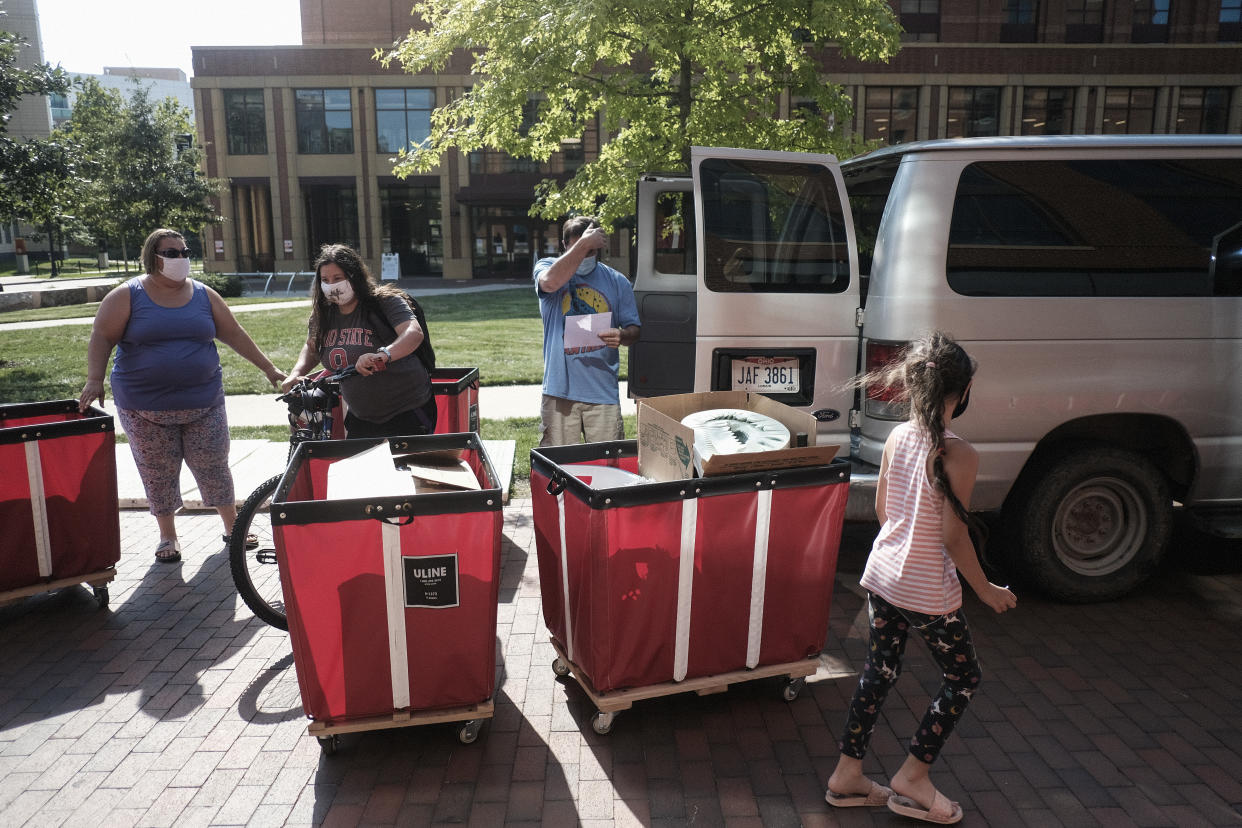Ohio State University has already canceled spring break. Experts predict 'this will become very common.'

The Ohio State University recently announced that it will cancel spring break in an effort to try to help stop the spread of COVID-19.
University Provost Bruce A. McPheron made the announcement in an email to students, faculty, and staff last week that was obtained by Yahoo Life, noting that the email was written “to provide clarity about spring semester 2021 so that you can begin to make plans.”
“There will be no spring break,” McPheron wrote. “Instead, there will be two instructional breaks — on Tuesday, Feb. 9, and Wednesday, March 31—where there will be no classes. This approach will keep our community together throughout the semester and reduce travel-related exposures.”
Classes will end earlier than usual, on April 22, and graduation will take place on May 9. “By moving these dates forward, we will allow more time to plan for summer term classes,” McPheron wrote.
“To students, faculty and staff alike, thank you for your continued flexibility as we respond to an ever-changing situation,” McPheron said.
A spokesperson for OSU referred Yahoo Life to McPheron’s email.
Several students spoke out against the move on Twitter.
osu canceling spring break bc of covid but still having in-personal classes (so they an charge full tuition) just isn’t sitting right with me
— Chloe G McGowan (@chloe_mcgowanxx) September 11, 2020
OSU canceled spring break and I'm going to have a mental breakdown. How's your morning going?
— Oseremhen Arheghan (@osearheghan) September 11, 2020
While students aren’t happy about this move, it’s unlikely to do them any real mental harm, clinical psychologist John Mayer, author of Family Fit: Find Your Balance in Life, tells Yahoo Life. “The mental-health benefits of canceling spring break are outstanding,” he says. “In my experience with students, canceling spring break will not be a trauma in their lives that will have emotional consequences.”
The college experience already has “many diversions” built into it, so students will have plenty to do to mentally recharge, Mayer says. “It is not like this concept of spring break is a necessary ingredient of higher education,” Mayer says. “Traditionally, there were many contributors to why schools initiated a spring break, but mental health concerns was not the primary motivation for this scheduled break.”
“The students will be fine,” he adds.
Infectious disease experts say the move by officials at The Ohio State University is a smart one—and they expect other schools will do the same.
Related video: Iowa colleges cancel spring break
“If the campus is basically a bubble, you would not want to introduce the virus,” Dr. David Cennimo, assistant professor of medicine-pediatrics infectious disease at Rutgers New Jersey Medical School, tells Yahoo Life. “Of course, this requires the campus to actually be a bubble, which is more probable if there is low local transmission and no or few ongoing cases.”
Dr. William Schaffner, an infectious disease specialist and professor at the Vanderbilt University School of Medicine, tells Yahoo Life that canceling spring break is a “good idea.”
“We’ve already learned that there are many young people in college who are ignoring recommendations not to party in large groups,” he says. “Doing anything we can to inhibit the mass migration of college students to places like Florida, where they’re having a continuing surge of COVID-19, is important.”
“Spring break is going to involve [the] mixing of people from schools doing things that aren’t conducive to social distancing,” Dr. Amesh A. Adalja, senior scholar at the Johns Hopkins Center for Health Security, tells Yahoo Life. “Trying to limit exposure that individuals might have on spring break and keeping campuses as closed as possible is the best way to prevent outbreaks.”
While many students spend spring break partying, plenty of others use that time to visit family. “Canceling break also prevents some college students from visiting their grandparents for a week,” Cennimo points out.
But whether or not this will help keep COVID-19 cases down on campus remains to be seen. “There is no experiment to prove this, but it makes excellent sense,” Dr. John Sellick, professor of medicine in the Division of Infectious Diseases at the University at Buffalo/SUNY, tells Yahoo Life. Many schools have canceled fall breaks in an effort to keep kids on campus as long as possible, he points out. “I would suspect that many schools that have not gone virtual will try to do this as they have done for the fall,” Sellick says.
Adalja agrees. “I think this will become very common,” he says.
For the latest coronavirus news and updates, follow along at https://news.yahoo.com/coronavirus. According to experts, people over 60 and those who are immunocompromised continue to be the most at risk. If you have questions, please reference the CDC’s and WHO’s resource guides.
How to maintain your physical and mental health during the pandemic
Taking care of a loved one with COVID-19? Here’s how to stay healthy
Q&A with Dr. Kavita Patel: How to keep your family safe and maintain your mental health
Read more from Yahoo Life
Want lifestyle and wellness news delivered to your inbox? Sign up here for Yahoo Life’s newsletter.

